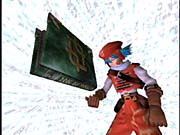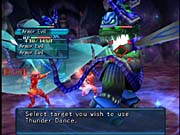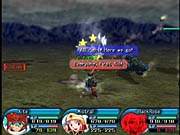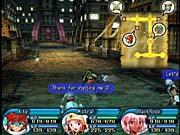Just three months ago, Bandai released the first installment in a four-part episodic action RPG series called .hack (pronounced "dot hack"), which was nothing to write home about in terms of gameplay but featured a distinctive premise. The series is set in a near future in which millions around the world are addicted to a massively multiplayer online role-playing game called The World. When one young player learns that a friend of his has fallen into a coma after they experience a bizarre in-game event, he takes it upon himself to investigate by continuing to play The World as his alter ego, a character named Kite. He soon finds evidence of what appears to be a massive conspiracy surrounding The World, but by the end of the first installment, he's made little real progress toward solving the mystery. And the gameplay of .hack, taking place almost entirely within the randomly generated battlefields of The World, was much more straightforward than the concept. Now the second chapter is here, and it provides an experience that is very similar to the first. In fact, not only does it bring you exactly the same sort of repetitive hack-and-slash gameplay, but it's also similarly short and simple and once again offers little in the way of plot or character development.

Mutation (the title of the second .hack episode) is a full-priced product, but it's a continuation rather than a conventional sequel--it uses most of the same graphics, sounds, and gameplay elements as Infection, the first installment, and it picks up right where that game left off. Mutation does loosely attempt to summarize the first game if, by some chance, someone decided to play it without playing through the original first. But Mutation was clearly designed for those who did finish Infection, as it allows them to import their character data into the new game and continue with Kite's adventures. In Infection, Kite started off as a first-level newbie character, though he could reach approximately level 30 by the end of that game. Even if you don't import your data, Kite will still start at a high level here and will grow to about level 50 before the conclusion of Mutation. This second game offers another 15 to 20 hours of gameplay, like the first.
If Infection was guilty of being overly repetitive, then Mutation is even guiltier--in short, it's a lot more of the same. It has only one small new town (though the two towns from Infection are also accessible), a handful of new environments, several throwaway new characters, and some new enemies and items. The minigame from Infection, in which you raised piglike creatures called grunties by feeding them various types of food, has also been expanded on slightly. As if to make up for the relative lack of substance, Mutation, like Infection, also comes packaged with an anime DVD that shows the unusual world of .hack from another angle. At any rate, considering that two more such games are apparently coming soon, you'll probably come to the conclusion by the end of Mutation that the concept of .hack would have been much better served by a single excitingly paced game rather than four potentially uneventful installments. The gameplay here just isn't nearly interesting enough to carry four games in nine months, though on its own merits, the gameplay isn't bad.

You'll always control Kite directly, though he can travel with up to two companions at a time. You'll have many to choose from, but with the exception of those who belong to the magic-wielding wavemaster class, they're all roughly the same in practice. The game is easy to play. You view the action from a third-person perspective, and you use the left analog stick to move your character around, the right stick to control the camera, and the R1 button to quickly reset the camera at your back. Should an enemy move offscreen in the middle of a battle, a convenient indicator along the edge of the screen will point you toward it, and there's always a minimap to keep you from getting lost. Some convoluted interface screens and an infuriating limit on the number of items you can carry bog down the pace of the game, but that's exactly as it was in Infection.
The gameplay again essentially boils down to traveling to a series of randomly generated battlefields, each of which features a randomly generated dungeon that is filled with monsters and treasure chests. Though there are a number of different "skins" for the battlefields and dungeons, and though the makeup of these areas is always somewhat different, they all become effectively identical after a while. Even the plot-critical areas of the game feel like they were randomly slapped together--because they were. In between slogging through battlefields and dungeons, you return to town to buy or trade for new equipment, especially healing items.
The combat is mostly just a hack-and-slash affair requiring little skill or strategy, though it's fast-paced and it looks good. You give your party members simple orders, such as to use their battle abilities or their healing skills, and you can engage enemies yourself using normal and special attacks, as well as some spells. The battles appear to take place in real time, but they don't. The game automatically pauses whenever you bring up a menu for using healing items and special abilities, so in practice you'll be looking at menu screens nearly as often as you'll be looking at an actual battle playing out. The combat usually isn't very difficult, though the occasional enemy will use crippling special abilities on you and your party, causing your characters to become paralyzed, to fall asleep, or to attack each other. Unlike in a real MMORPG, it's game over and back to the title screen here if all your characters "die," but once you learn to deal with these peskier foes, you'll have little trouble cutting your way through any and all monsters.

Like Infection, Mutation is completely linear, though there are a few optional side quests. Both games are structured in such a way that you can spend as much time as you want going to random battlefields (whose terrain and difficulty you can customize using the game's area password system) in between going to the ones that are key to the plot. And both games are cut short just as things start to get interesting. Just like in Infection, in Mutation some mysterious characters are introduced, some intriguing events take place, and that's about it. You don't really learn anything about anyone, and you still don't come any closer to getting to the bottom of the supposed conspiracy. The new characters who join you are largely irrelevant to the proceedings, just like most of the characters from the first game, so at the end of it all you might feel somewhat cheated. The back of the box claims that the game has "Mature Sexual Themes," but that's a bald-faced lie.
As mentioned, Mutation looks pretty much identical to Infection, though that game looked good. The battlefields use a nice soft-focus effect for background scenery, and there are a number of different environments, ranging from desert to tundra. The game uses the same exact graphical effect for virus-infected areas seen in its predecessor, where chunks of the environment are ripped out to reveal programming code within, like something out of The Matrix. Unfortunately, a lot of the textures are quite blurry up close, and the character models aren't very detailed either. But the character designs are good, and Kite's quirky companions are basically likable enough, even though your interactions with them are limited. At any rate, the game succeeds at having a distinctive style, one that will particularly appeal to younger players, despite the game's roots in the sort of stuff--computer hacking and MMORPGs--you'd sooner expect to see older gamers interested in.

The game sounds good, too, despite the uneven quality of the music. Certain types of battlefields are paired with an endlessly looping track that's obnoxiously loud and way too comical, but other areas have themes that fit the game really well. Either way, the exploration music seamlessly transitions into combat music when you run into a pack of enemies. The sounds of battle are well done, and the voice acting is on par with what you'd expect to hear from dubbed anime these days--the voices suit the characters fine, and most everyone sounds really enthusiastic. Bandai also thankfully left in the original Japanese speech as an option. The game reserves audible speech mostly for use in cinematic cutscenes, and it probably could have used it more extensively.
You can finish the game in 20 hours or less, though you can continue playing after that, unlocking some secrets and finding better equipment. Subsequent installments in the series will again allow you to export your character data, continuing on from where you left off. And hopefully future installments won't merely offer more of the same random hack-and-slash gameplay along with another 15-20 hours' worth of story that doesn't really go anywhere. The first .hack game featured a great premise and gameplay that didn't live up to the promising conceit. With Mutation, Bandai didn't even try to improve on a game with some obvious shortcomings, and at this point it seems the developer will be content to drag out what seems to be a skimpy storyline across two more $50 installments. From a technical standpoint, Mutation is every bit as good a game as Infection was before it. But even if you really liked Infection, you probably won't like this second installment as much, since it's just like the first, minus the originality.